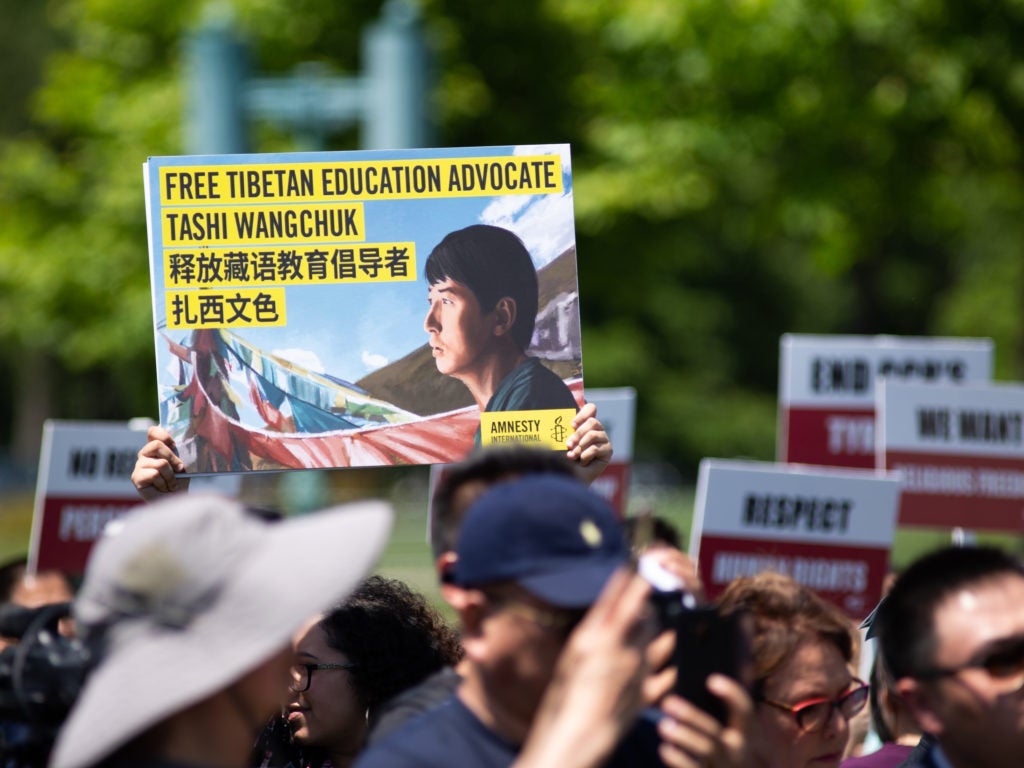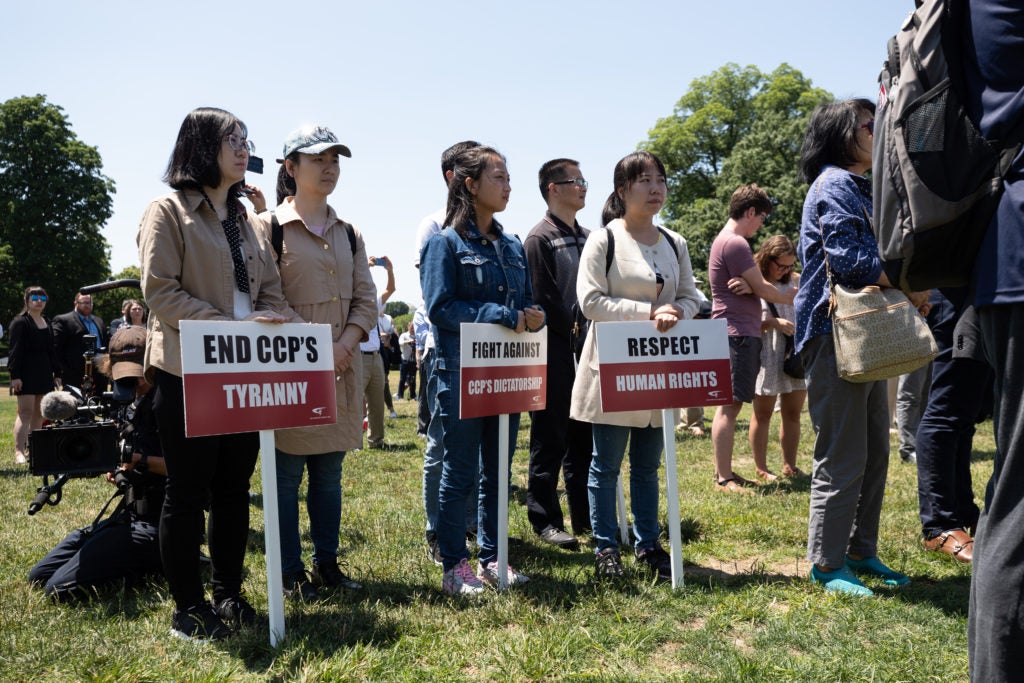Why These 5 People Think We Shouldn’t Forget Tiananmen Square
Carmel Kookogey / Kaylee Greenlee /
Thirty years after the Tiananmen Square massacre, the Chinese government continues to commit human rights abuses. Officials burn Bibles, force hundreds of thousands of Uighur Muslims into re-education camps, and sterilize women who violate the one-child policy.
A crowd gathered Tuesday on the West Lawn of the Capitol for an event organized by the Victims of Communism Memorial Foundation to commemorate the hundreds, perhaps thousands, killed in the 1989 massacre in central Beijing—and to raise awareness for ongoing human rights violations in China.
The Daily Signal spoke with five attendees about why the remembrance rally was important to them, and why they came. Here’s what they said.

Chengdong
Chengdong, who was born and raised in China, said he is in the United States for a year as an exchange student. Citing security concerns upon returning home, he requested that neither his last name nor a photo of him be published.
A college student in his 20s, Chengdon said he attended the anniversary event Tuesday out of curiosity, because he had heard only one official narrative of what happened at Tiananmen Square since China’s communist regime covered up the massacre.
>>> Related: Tiananmen Square Remembrance Sheds Light on Tyranny of Communism
“I’ve known that Tiananmen Square incident for like 10 years,” he said, adding:
It’s not easy for my age to know that, because I grew up in the ’90s and the historical story is buried. I know the story, but I don’t know the full picture. I know that something happened in 1989, but the whole narrative is controlled—the controlled narrative they prefer to tell.
Chengdong elaborated on the government restrictions on speech and information in China, which led to his desire to explore Chinese history once in America.
He said he always wondered why parts of history were withheld from the Chinese people, so he began reading and doing his own research here.

“From my generation, I can say that probably less than 5% of people know the existence of the Tiananmen Square massacre,” Chengdong said, adding: “And even the majority of people who know buy the narrative the government likes, that they were mobs, and terrorists, [and that] we are all just defending our country.”
“It is very disturbing,” he said.
When asked about what the U.S. should be doing about human rights in China, Chengdong expressed concern for America’s involvement in trade negotiations without conditions based on humanitarian reforms.
He referred to the Trans-Pacific Partnership Agreement, which the Trump administration exited.
“The TPP human rights issue was included in the trade talks, but now the trade war is more about tariffs, equality, and reciprocal treatment and not about human rights at all,” Chengdong said.

Sam Chang
Sam Chang, 82, attended the Tiananmen Square event in his wheelchair, helped by his wife and a friend.
Chang, a retired atmospheric scientist who described himself as having a “Chinese background,” said he attended the rally because he saw an ad in a newspaper.
“I saw this,” he said, holding up the ad. “I saw this. I care about human rights.”
When asked about the current human rights situation in China, Chang pointed to the government headed by President Xi Jinping, also general secretary of the Chinese Communist Party.
“It’s a communist regime,” Chang said. “And it affects human rights. I think Americans should support human rights in China.”

Lianchao Han
Lianchao Han, a student leader in China prior to the Tiananmen Square protests, said he was visiting America at the time of the massacre.
Han, now middle-aged and a Virginia resident, said he attended Tuesday’s rally “in continued remembrance of the fallen, so we can carry on what they haven’t finished in China.”
Han is vice president of the group Citizen Power Initiatives for China, which co-hosted the rally.
The human rights situation in China has become “more repressive,” Han said, pointing to “mass surveillance, the crackdowns on dissidents,” and “massive detentions” to show how China has “become a real police state.”
Han told The Daily Signal it is imperative that Americans understand ongoing human rights abuses in China and how they are a threat not only to Chinese nationals but to democracy here.
“I think it’s critical for America to understand that the Chinese regime is the present danger to the free world, and to American democracy,” he said, adding:
They have been deeply penetrating into this country. The influence is so incredible now. And now we have bipartisan consensus that realizes China is a threat.
President Trump changed his National Security Strategy to focus on China, to define China as a long-term competitor. It’s important to see China’s divide with the free world and American values. And once we understand that, we need to disengage with the Chinese regime, to delegitimize Xi Jinping, because he’s a real dictator.
What’s most important to him, Han said, is making sure that Americans understand the strategic threat China poses.
“They want to use Chinese communist so-called ‘civilization’ to replace Western civilization. That’s their goal. That’s their strategic intention,” he said. “Once we understand that, we have to do everything to stop them.”
Han said he remains hopeful.
“You can see many people gathered here: China’s civil resistance never stops. It’s always there. We are a strong civil society, despite the bloody crackdown of a very repressive regime,” he said.
Han added that he believes America is on the “right course” to counter China’s threat.
“I’m very happy with President Trump’s foreign policy, and I’m super happy with the bipartisan response from Congress. I think we’re on the right course,” he said.

Dede Laugesen
Dede Laugesen said she traveled to Washington for the rally to help raise awareness of persecuted faiths in China, particularly Christianity.
“China is looking to Sinicize religions in China, to make them more in line with the Communist Party,” Laugesen, 49, told The Daily Signal. “They’re actually looking at rewriting Scripture, the Ten Commandments—especially the first and second commandments—so that it comes in line with the Chinese Communist Party. We’re very concerned about that.”
Laugesen, a resident of Monument, Colorado, is executive director of the group Save the Persecuted Christians, which is based there.
Religious freedom is the No. 1 freedom that must be secured, Laugesen said, because without the right to worship and live out their religion freely, the people of China never will experience “true liberty and freedom.” She said:
The human rights abuses that are occurring because of the persecution of people of faith in China is something that the world really needs to know more about. The heroes of Tiananmen Square are the ones who brought light to what’s going on in China, and unfortunately, everything in China has just gotten worse for people of faith.
We think that President Xi is an autocrat. He is a Leninist, Maoist, communist dictator, who is threatened by the freedoms that people experience when they’re able to express their faith and the coalescing of people of free thought that is not in line with the suppressing aims of a communist regime.
Laugesen said Save the Persecuted Christians would like to see President Donald Trump remember human rights abuses and religious freedom in his conversations and negotiations with China.
“In all things, religious freedom and human rights need to be addressed before we go forward with our trade negotiations with China,” she said.

Ronald Quasebarth
Asked what brought him to the rally, Ronald Quasebarth replied with one word: “Communism.”
“Communism is the biggest evil in the history of mankind,” Quasebarth said. “It’s proven, almost no matter what industry you pick: economic, humanitarian rights, religious freedom, anything. Pick any of them: They are the biggest disaster in the history of the world, bar none.”
Quasebarth, a retired bridge-construction manager, who resides in Fairfax, Virginia, attended the Tiananmen Square rally with a sign that read, “Socialism equals genocide.”
“I’m here because the American people are half-asleep now,” he said.

Quasebarth pointed to his T-shirt, emblazoned with the word Solidarnosc, a reference to the Polish trade union, Solidarity, that bucked communist control in the 1980s.
“They’ve forgotten this message,” he said. “They’ve forgotten about Tiananmen Square, they have almost no idea about the gulags, they’ve forgotten the Harvest of Sorrow, the Killing Fields, all the rest.”
Quasebarth said he used to attend protests of the Vietnam War in the late 1960s as a young “quasi-Marxist.” After reading Aleksandr Solzhenitsyn’s book “The Gulag Archipelago” at the request of his sister, he said, his beliefs began to change.
“We made a bargain with each other that if we saw truth, it didn’t matter who saw it first, we would honor it. And by the Killing Fields, I was done with the New Left,” Quasebarth said. “By the early ’80s, I was for the freedom fighter movement with Reagan.”
Now, he said, America needs to do more to address the human rights crimes in China, which he sees as largely a result of the Marxist values he rejected decades ago.
“We opened up the markets to China in the early ’90s with no requirements, knowing full well what they were about, two years after Tiananmen,” Quasebarth said. “So I think we have to face up to what our sins are, and wake the rest of the world.”
Quasebarth said he is happy with Trump’s efforts on China policy, but wants to see more.
“Trump is starting, but it’s not just all economics,” he said.
